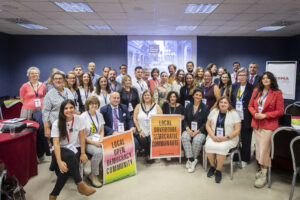Faces of Open Government: Basque Country
Rostros de Gobierno Abierto: Isabel Moya Pérez
The Basque Country in Spain has been working to involve different levels of administrations (local, regional and autonomous) and citizens in the policy-making process. Government reformers are engaging a variety of actors to ensure the different realities and perspectives of Basque Country are reflected in the process and policy outcomes.
Arantza Otaolea from the Bilbao Women’s Council and co-president of OGP Euskadi, and Mikel Barturen from Sareen Sarea, an association that groups the networks of entities of the social sector, are participants in OGP Euskadi’s civil society forum. In this interview, they share why citizen participationAccording to OGP’s Articles of Governance, citizen participation occurs when “governments seek to mobilize citizens to engage in public debate, provide input, and make contributions that lead to m... More is fundamental to open government.
What brought you closer to the issues of transparencyAccording to OGP’s Articles of Governance, transparency occurs when “government-held information (including on activities and decisions) is open, comprehensive, timely, freely available to the pub... More, inclusionOGP participating governments are working to create governments that truly serve all people. Commitments in this area may address persons with disabilities, women and girls, lesbian, gay, bisexual, tr... More, participation, and accountability?
Arantza
The opportunity to amplify citizens’ voices through constructive criticism is crucial. In any area, it underscores the importance of soft skills and good governance. This entails fostering collaborative work, building networks, and setting goals with measurable results.
When I was elected co-president of OGP Euskadi, I found myself involved in a world that I had followed in a tangential way and now became a part of. To enhance the effectiveness of my involvement, I dedicated myself to gaining a deeper understanding of public management, transparency, participation, and accountability.
Mikel
I am part of a vast and diverse network of civil society organizations committed to the social inclusion of the most vulnerable people, families, groups, and communities.
That’s how I became closer to OGP’s values. Institutions are tools at the service of citizens, which should ensure their well-being. After all, institutions exist thanks to the contributions and resources that citizens provide to public administrations for their maintenance. We are facing great challenges for humanity, and it requires the participation of everyone, without excluding anyone. If we truly seek change rooted in democratic legitimacy, we must ensure that civil society remains connected and engaged with its institutions
Euskadi is an autonomous community of Spain considered a “historical nationality” because of its collective, linguistic, and cultural identity. How is this identity reflected in the open government structure of Euskadi?
Arantza
Our goal is to provide equal access to services and a common language that is understandable to all citizens. We seek collaboration between institutions to establish common minimum requirementsAll OGP participating countries are expected to adhere to the Participation and Co-Creation Standards. Each Standard includes clear and measurable minimum requirements that all OGP participating count..., regardless of the size of the institution.
For each commitmentOGP commitments are promises for reform co-created by governments and civil society and submitted as part of an action plan. Commitments typically include a description of the problem, concrete action... of the OGP action planAction plans are at the core of a government’s participation in OGP. They are the product of a co-creation process in which government and civil society jointly develop commitments to open governmen..., one administration assumes the leadership and the budget for its development, and the final results are made available to all Basque administrations. This aligns with Sustainable Development Goal 17, “Partnership For the Goals,” and is based on the principles of open government.
We have established a forum that encourages the participation of a diverse society. It takes into account different sensitivities, needs, and interests, including urban and rural visions, various age groups, social exclusion, and migration, all with a genderOGP participating governments are bringing gender perspectives to popular policy areas, ensuring diversity in participatory processes, and specifically targeting gender gaps in policies to address gov... More perspective.
Mikel
In the Basque Country, we have a complex institutional architecture that encompasses multiple jurisdictional and territorial levels. It has been a wise decision to involve all three levels – municipal, regional, and autonomous – in the open government experience to avoid dysfunctionality.
Our idiosyncrasy allows for institutions that are closer to citizens, more responsive to the impulses of civil society. In our case, the greater the level of self-government, the greater the institutional openness, participation, impulse, development, and social legitimacy.
The Independent Reporting Mechanism (IRM)The Independent Reporting Mechanism (IRM) is OGP’s accountability arm and the main means of tracking progress in participating countries. The IRM provides independent, evidence-based, and objective ... has acknowledged the enhanced role of civil society in the “Foro Regular de Euskadi”. What recommendations would you offer to other members of the Partnership in this regard?
Arantza
Political participation is no longer simply seen as exercising the right to vote but rather as requiring active engagement. If we expect people to invest their time and dedication, we must also value their contributions, as these will yield meaningful results.
Undoubtedly, the greater the number of participants involved, the more complex the participation becomes. However, this leads to a deeper understanding of the issues at hand and how they impact different groups. It ultimately improves the overall processes, resulting in more significant and tangible outcomes.
Mikel
Broadening participation enriches processes and enhances the impact and results. While it undoubtedly requires additional effort, the benefits make it well worth the investment.
ALTXOR is one of the commitments within your OGP action plan, that offers information, guidance, intermediation, and specialized support for individuals over 65 years of age. What do you want to achieve with this commitment, and how did you incorporate a gender perspective into its implementation?
Arantza
ALTXOR, which translates to “treasure” or “capital,” emerged as a response to the co-creation proposals for the second OGP action plan of Euskadi. Upon analyzing these proposals, it became evident that many of them converged around addressing the needs of people aged 65 and above. This initiative seeks to foster collaboration between the government and social organizations representing the elderly. Notably, it has been funded through the EU Recovery and Resilience Facility, underscoring its importance. The proposal aims to allow older people to do what interests them – without limitations due to their age – and live a full life.
From their inception, peer working groups have embraced a gender perspective. Surveys conducted have addressed both common and gender-specific challenges faced by women. Consideration has been given to factors such as time availability, economic capacity, and other aspects influenced by age and geographic location. Furthermore, the service has been designed with usability and the digital divide in mind, ensuring that older women have access to user-friendly applications.
The budget transparency and accountability tool stands out as one of the most captivating commitments within the OGP action plan being implemented in the Basque Country. What is the objective behind this commitment?
Mikel
Citizen participation in public policy is a right, a responsibility, and a necessity. It is crucial to overcome the crisis of confidence in institutions through honesty, transparency, and a genuine commitment to citizens.
The transparency and accountability tool that we are currently developing focuses on budgetary matters and targets all three levels of the Basque administrations. Its main objective is to provide accessible public accounts to all citizens, using simple and visually engaging language. Specifically, the tool aims to inform individuals about how our institutions utilize taxPlacing transparency, accountability, and participation at the center of tax policy can ensure that burdens are distributed equitably across society. Technical specifications: Commitments related to c... revenues. This enables citizens to critically analyze the allocation of resources within their closest governing bodies and actively participate by making well-informed and thoughtful proposals. Civil society organizations must similarly demonstrate unwavering commitment and transparency in their actions.
La Semana de Gobierno Abierto (OGW por sus siglas en inglés) se celebra en mayo de cada año para reunir a los gobiernos y la sociedad civil y encontrar soluciones a los problemas más apremiantes que enfrentan las comunidades a través de eventos, debates públicos, webinars y más. Isabel Moya Pérez es la Subdirectora General de Gobierno Abierto de España y comparte lo que hizo su país durante su propia OGW y cómo la nueva estrategia de OGP puede ayudar a fomentar democracias más abiertas y responsables.
¿Por qué la Semana de gobierno abierto es tan importante para España?
España es un país abierto, que ha hecho de la mejora de su democracia un objetivo compartido por todas sus instituciones públicas. La Semana del Gobierno Abierto es una oportunidad para que todas las personas en el país, vivan donde vivan, conozcan mejor cómo funcionan por dentro sus administraciones, en qué estamos trabajando y cómo se prestan los servicios públicos. La Semana es también un buen ejemplo de la importancia que damos a la colaboración entre las administraciones y con la sociedad civil en un Estado como el nuestro, fuertemente descentralizado, en el que sus Comunidades Autónomas (nacionalidades y regiones) y sus municipios disponen de autonomía política y administrativa.
La transparencia y la rendición de cuentas, la integridad pública, la participación y la colaboración son los valores comunes que defendemos. La Semana nos permite sensibilizar a la ciudadanía sobre el rol que juegan en la democracia y la importancia de que todas las personas ejerzan plenamente sus derechos de acceso a la información pública y a participación. El Foro de Gobierno Abierto de España adoptó en 2021 un Acuerdo por la comunicación inclusiva del Gobierno Abierto y éste es también un compromiso que España ha asumido en el IV plan, así que estamos en línea con esta ilusionante iniciativa de OGP.
¿Qué tipo de eventos organizaron para la Semana de gobierno abierto? ¿Nos pueden dar dos ejemplos de eventos que ayudaron a avanzar la agenda de gobierno abierto en el país y contribuyeron a la cocreación o implementación de reformas de gobierno abierto?
Gracias al compromiso de las y los promotores, la Semana de 2023, que en España se adelantó a marzo para no interferir con la convocatoria de elecciones autonómicas y locales, se ha saldado con la inscripción de 1025 eventos, que es un número realmente muy elevado. De ellos, 431 han consistido en jornadas de puertas abiertas y 100 en seminarios/webinarios. Pero, también se han celebrado 82 en talleres, 77 charlas informativas, 75 presentaciones de planes públicos y 54 debates o coloquios, así como procesos participativos como lanzamientos de consultas o eventos de contenido virtual.
España ha batido, por tanto, su propio récord (el 2022 organizamos 500 actividades) y estamos muy satisfechos con estos resultados. Todas y cada una de estas actividades constituyen un granito de arena para continuar avanzando en la agenda del gobierno abierto en nuestro país, pero citaré algunos eventos que, a mi juicio, pueden ilustrar el grado de compromiso político de todos los poderes del estado con los objetivos de la Semana.
Por ejemplo, la Ministra de Hacienda y Función Pública participó en la reunión anual del Pleno del Foro de Gobierno Abierto, que celebramos en la Comunidad Autónoma de La Rioja, apoyando el compromiso del Gobierno de España con los valores del gobierno Abierto y destacando el papel que juega nuestro órgano multiactor en el diseño, la implementación y la evaluación de las políticas de gobierno abierto.
También participaron en la Semana otros ocho ministros y ministras, como el de Universidades, que es un reputado experto en participación en políticas públicas, que impartió una interesante conferencia, a través de nuestro laboratorio HazLab, con el título “Las Políticas Públicas: entre la tecnocracia y la democracia”, o el ministro del Interior que inauguró la semana, llevando los valores del gobierno abierto, al Centro Penitenciario de Dueñas en la provincia de Palencia, con ocasión de sus 25 años de funcionamiento.
De especial interés ha sido también la Jornada sobre la reforma de la Ley de transparencia que se desarrolló en el Centro de Estudios Políticos y Constitucionales con la participación de los representantes de los órganos constitucionales y de relevancia constitucional, que hicieron interesantes aportaciones sobre dicha reforma, para la que se ha abierto un amplio proceso participativo en el seno de nuestro Foro de Gobierno abierto.
Lo importante es que el Gobierno Abierto, durante la Semana, llegue a todas las personas, cualquiera que sea su lugar de residencia o circunstancias personales o socioeconómicas.
¿Cuál es tu consejo para otros países y localidades organizando eventos para la Semana de gobierno abierto?
En mi opinión, la clave para el éxito de la Semana en España está en la coordinación y la cooperación entre todos los actores que participan en el sistema de gobernanza del IV Plan de España: El Foro de Gobierno Abierto, la Comisión Sectorial (que reúne a los tres niveles de Administración: esta, autonómica y local), y el Grupo interministerial de Unidades de Información de Transparencia y Gobierno Abierto, y, por supuesto las organizaciones de la sociedad civil. Con todos ellos hemos consensuado con antelación suficiente a su celebración, la hoja de ruta para la organización de la Semana. La inscripción de eventos se realiza a través de un formulario en el Portal de Transparencia y mi equipo de gobierno abierto se vuelca para que todo salga bien, revisando inscripciones y resolviendo dudas. Mi consejo es fortalecer la colaboración con todos los actores para lograr el éxito de esta iniciativa.
Felicidades al gobierno de España por haber sido seleccionado como parte del Comité directivo de OGP. Ahora que su término comenzará oficialmente en octubre de 2023, ¿qué es lo que más les emociona de tener este nuevo rol?
España se incorporó en 2011 a la Alianza, pero hasta este año no nos habíamos planteado la posibilidad de ser miembros del Comité Directivo de OGP. Nos emociona, especialmente, que este primer mandato de España en la dirección de la Alianza coincida también con la presidencia española del Consejo de la Unión Europea y de que tengamos la oportunidad, junto al resto de miembros del Comité, de contribuir al objetivo de hacer posible que los valores del gobierno abierto sean considerados como auténticos derechos ciudadanos.
Queremos aportar ideas, porque consideramos que nuestra experiencia en la OGP ha sido muy positiva y que ha llegado el momento de que apostemos por una mejor democracia trabajando juntos. España es un Estado, desde el punto de vista político y territorial, fuertemente descentralizado. Nos gustaría aportar nuestra experiencia en el diseño y ejecución del IV Plan de Gobierno Abierto de España 2020-2024, que se está desarrollando de manera cooperativa con los distintos niveles de gobierno y con la sociedad civil. En este sentido nuestra experiencia puede ser un referente para otros países que tiene estructura federal o regional. Tenemos también muchas ganas de escuchar y de aprender del resto de los miembros del Comité y trabajar con ellos para impulsar los valores del gobierno abierto en todo el mundo. Poder sumar voluntades de cambio nos parece apasionante.
OGP acaba de lanzar su estrategia para los próximos cinco años (2023-2028) para responder mejor a las necesidades de la comunidad y abordar los desafíos que enfrentan las democracias hoy. ¿Qué oportunidades ofrece la nueva estrategia para la comunidad de OGP? ¿Y qué es lo que más te emociona de la estrategia?
Lo que más me emociona de esta estrategia es la oportunidad que supone para que, entre todos, avancemos en la mejora de la democracia, dando respuesta a las expectativas ciudadanas de modo que la transparencia, la rendición de cuentas, la participación y la inclusión formen parte consustancial de la gobernanza pública.
La estrategia supone, en este sentido, un cambio de visión, que España comparte, de que no sólo es necesario ampliar el número de reformadores, sino de que debemos sumar también a este esfuerzo colectivo a los que aún no pertenecen a nuestra Comunidad, poniendo a las personas en el centro de las decisiones gubernamentales. Para afrontar estos retos es imprescindible que seamos capaces de asumir compromisos concretos y ambiciosos, pero siendo conscientes de que partimos en cada caso de diferentes realidades.
La estrategia apuesta además por la inclusión, que, como ya he dicho, a es un eje transversal de nuestro IV Plan de acción nacional, para que ninguna persona se quede atrás en el ejercicio de sus derechos democráticos por razón de su género, raza, discapacidad, situación socioeconómica o cualquier otra circunstancia. España está muy comprometida en el fortalecimiento de esta visión inclusiva del gobierno abierto. En mi opinión, la OGP debe continuar promoviendo activamente la igualdad de oportunidades y la inclusión social.
No comments yet
Related Content
 Challenges and Solutions
Challenges and Solutions
Open Data Euskadi: Five Lessons in 12 Years Opening Data
 Challenges and Solutions
Challenges and Solutions
Closer to the People: OGP Local Results
See the progress OGP Local members have made over the years and explore lessons learned as we head into a new season of co-creation.

From Regional to Local: Local Governments in Europe
The European open government community met at the OGP Europe Regional Meeting in Rome, Italy at a critical time when democracy and open government are under threat externally from events…


Leave a Reply